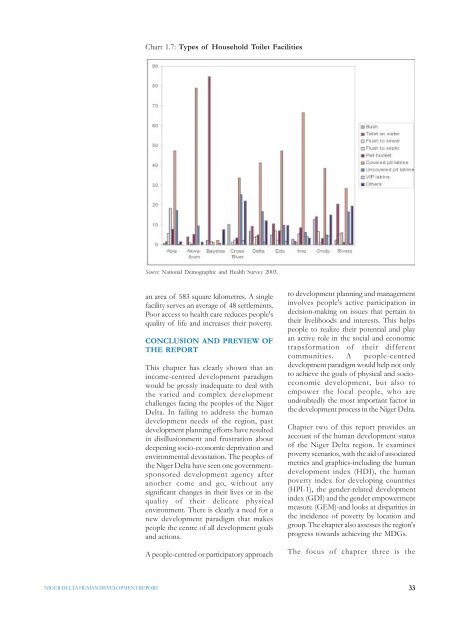Niger Delta Human Development Report - UNDP Nigeria - United ...
Niger Delta Human Development Report - UNDP Nigeria - United ...
Niger Delta Human Development Report - UNDP Nigeria - United ...
Create successful ePaper yourself
Turn your PDF publications into a flip-book with our unique Google optimized e-Paper software.
NIGER DELTA HUMAN DEVELOPMENT REPORT<br />
Chart 1.7: Types of Household Toilet Facilities<br />
Source: National Demographic and Health Survey 2003.<br />
an area of 583 square kilometres. A single<br />
facility serves an average of 48 settlements.<br />
Poor access to health care reduces people's<br />
quality of life and increases their poverty.<br />
CONCLUSION AND PREVIEW OF<br />
THE REPORT<br />
This chapter has clearly shown that an<br />
income-centred development paradigm<br />
would be grossly inadequate to deal with<br />
the varied and complex development<br />
challenges facing the peoples of the <strong>Niger</strong><br />
<strong>Delta</strong>. In failing to address the human<br />
development needs of the region, past<br />
development planning efforts have resulted<br />
in disillusionment and frustration about<br />
deepening socio-economic deprivation and<br />
environmental devastation. The peoples of<br />
the <strong>Niger</strong> <strong>Delta</strong> have seen one governmentsponsored<br />
development agency after<br />
another come and go, without any<br />
significant changes in their lives or in the<br />
quality of their delicate physical<br />
environment. There is clearly a need for a<br />
new development paradigm that makes<br />
people the centre of all development goals<br />
and actions.<br />
A people-centred or participatory approach<br />
to development planning and management<br />
involves people's active participation in<br />
decision-making on issues that pertain to<br />
their livelihoods and interests. This helps<br />
people to realize their potential and play<br />
an active role in the social and economic<br />
transformation of their different<br />
communities. A people-centred<br />
development paradigm would help not only<br />
to achieve the goals of physical and socioeconomic<br />
development, but also to<br />
empower the local people, who are<br />
undoubtedly the most important factor in<br />
the development process in the <strong>Niger</strong> <strong>Delta</strong>.<br />
Chapter two of this report provides an<br />
account of the human development status<br />
of the <strong>Niger</strong> <strong>Delta</strong> region. It examines<br />
poverty scenarios, with the aid of associated<br />
metrics and graphics-including the human<br />
development index (HDI), the human<br />
poverty index for developing countries<br />
(HPI-1), the gender-related development<br />
index (GDI) and the gender empowerment<br />
measure (GEM)-and looks at disparities in<br />
the incidence of poverty by location and<br />
group. The chapter also assesses the region's<br />
progress towards achieving the MDGs.<br />
The focus of chapter three is the<br />
33










